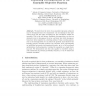Free Online Productivity Tools
i2Speak
i2Symbol
i2OCR
iTex2Img
iWeb2Print
iWeb2Shot
i2Type
iPdf2Split
iPdf2Merge
i2Bopomofo
i2Arabic
i2Style
i2Image
i2PDF
iLatex2Rtf
Sci2ools
130
click to vote
MCS
2005
Springer
2005
Springer
Between Two Extremes: Examining Decompositions of the Ensemble Objective Function
We study how the error of an ensemble regression estimator can be decomposed into two components: one accounting for the individual errors and the other accounting for the correlations within the ensemble. This is the well known Ambiguity decomposition; we show an alternative way to decompose the error, and show how both decompositions have been exploited in a learning scheme. Using a scaling parameter in the decomposition we can blend the gradient (and therefore the learning process) smoothly between two extremes, from concentrating on individual accuracies and ignoring diversity, up to a full non-linear optimization of all parameters, treating the ensemble as a single learning unit. We demonstrate how this also applies to ensembles using a soft combination of posterior probability estimates, so can be utilised for classifier ensembles.
Ambiguity Decomposition | Ensemble Regression Estimator | MCS 2005 | Pattern Recognition | Posterior Probability Estimates |
| Added | 28 Jun 2010 |
| Updated | 28 Jun 2010 |
| Type | Conference |
| Year | 2005 |
| Where | MCS |
| Authors | Gavin Brown, Jeremy L. Wyatt, Ping Sun |
Comments (0)

